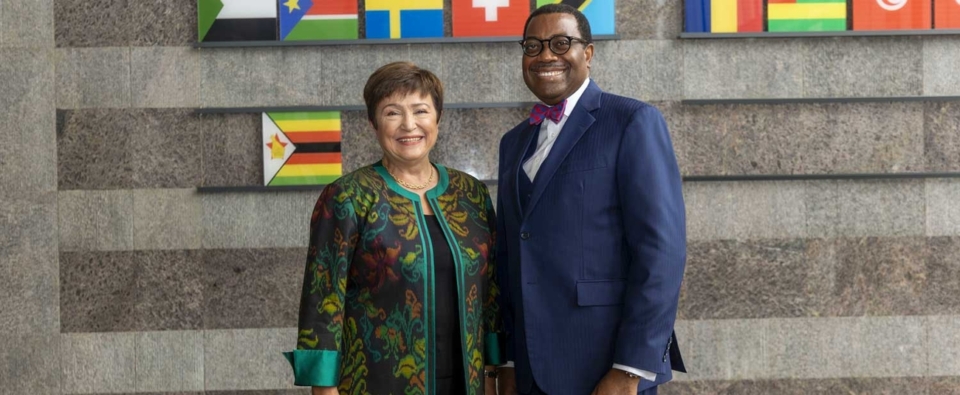The International Monetary Fund (IMF) has strongly supported a call by the African Development Bank Group urging countries in Africa to stop borrowing loans backed by their natural resources.
The IMF Managing Director, Kristalina Georgieva, met Thursday, October 5, 2023, with the President of the African Development Bank Group, Dr Akinwumi Adesina, in Abidjan, Cote D’Ivoire. It is the first time an IMF head has visited the Bank headquarters since its establishment in 1964.
Welcoming Madama Georgieva, Dr. Adesina said, “The natural resource-backed loans are non-transparent, expensive and make debt resolution difficult.” He warned that if the trend continues, “it will be a disaster for Africa.”
Madam Georgieva said the Fund’s senior management team will “carry out a thorough assessment. We will come with a strong voice to tell countries not to create avenues for predatory and enslaving loans.”
She said the issue would also be discussed at the Global Sovereign Debt Roundtable comprised of bilateral creditors, private creditors and borrowing countries. The roundtable is co-chaired by the IMF, World Bank and the presidency of the G20. The African Union joined the G20 in September as a permanent member.
The IMF chief said she is visiting Africa at a time when the continent holds much promise for more dynamic growth in the world.
“We often focus on the challenges that the continent is facing because it is here the impact of climate change is much more severe, where macro-economic and financial instability and debt are amplified.”
“But we want to focus on opportunities in Africa for the simple fact that the capital is in the North and a young population is in the South, primarily here in Africa. Unless we build a bridge for capital to flow to where it is needed most, it could lead to a bigger problem.”
Dr. Adesina praised bold efforts by the IMF chief and the US Secretary of Treasury Janet Yellen, at the height of the Covid-19 pandemic in 2021, to shore up the global economy by allocating $650 billion in Special Drawing Rights (SDRs).
Africa, with a population of more than 1.2 billion, received about $33 billion of SDRs, representing only 5 percent of the total allocation, the smallest portion among the different regions of the world.
The African Development Bank continues to lead conversations and develop models that will allow SDRs to be rechanneled through multilateral development banks. MDBs can leverage such resources three to four times their original values. Adesina thanked the IMF for working with the African Development Bank’s team on an initiative that could allow SDRs to be channeled through MDBs.
Latest Stories
-
George Twum-Barimah-Adu pledges inclusive cabinet with Minority and Majority leaders
21 seconds -
Labourer jailed 5 years for inflicting cutlass wounds on businessman
1 min -
Parliament urged to fast-track passage of Road Traffic Amendment Bill
2 mins -
Mr Daniel Kofi Asante aka Electrician
2 mins -
Minerals Commission, Solidaridad unveils forum to tackle child labour in mining sector
7 mins -
Election 2024: Engagement with security services productive – NDC
9 mins -
‘Let’s work together to improve sanitation, promote health outcome’ – Sector Minister urges
10 mins -
Ellembelle MP cuts sod for six-unit classroom block at Nkroful Agric SHS
13 mins -
‘I’ll beat the hell out of you if you misbehave on December 7’ – Achiase Commanding Officer
16 mins -
AFPNC leads the charge on World Prematurity Day 2024
22 mins -
Court remands unemployed man over theft of ECG property
28 mins -
Election security rests solely with the police – Central Regional Police Command
30 mins -
NCCE engages political youth activists at Kumbungu on tolerance
30 mins -
‘In Mahama’s era students lacked chalk, but are now receiving tablets’ – Bawumia
40 mins -
Project commissioning not a ploy to attract votes – Oppong Nkrumah
41 mins

